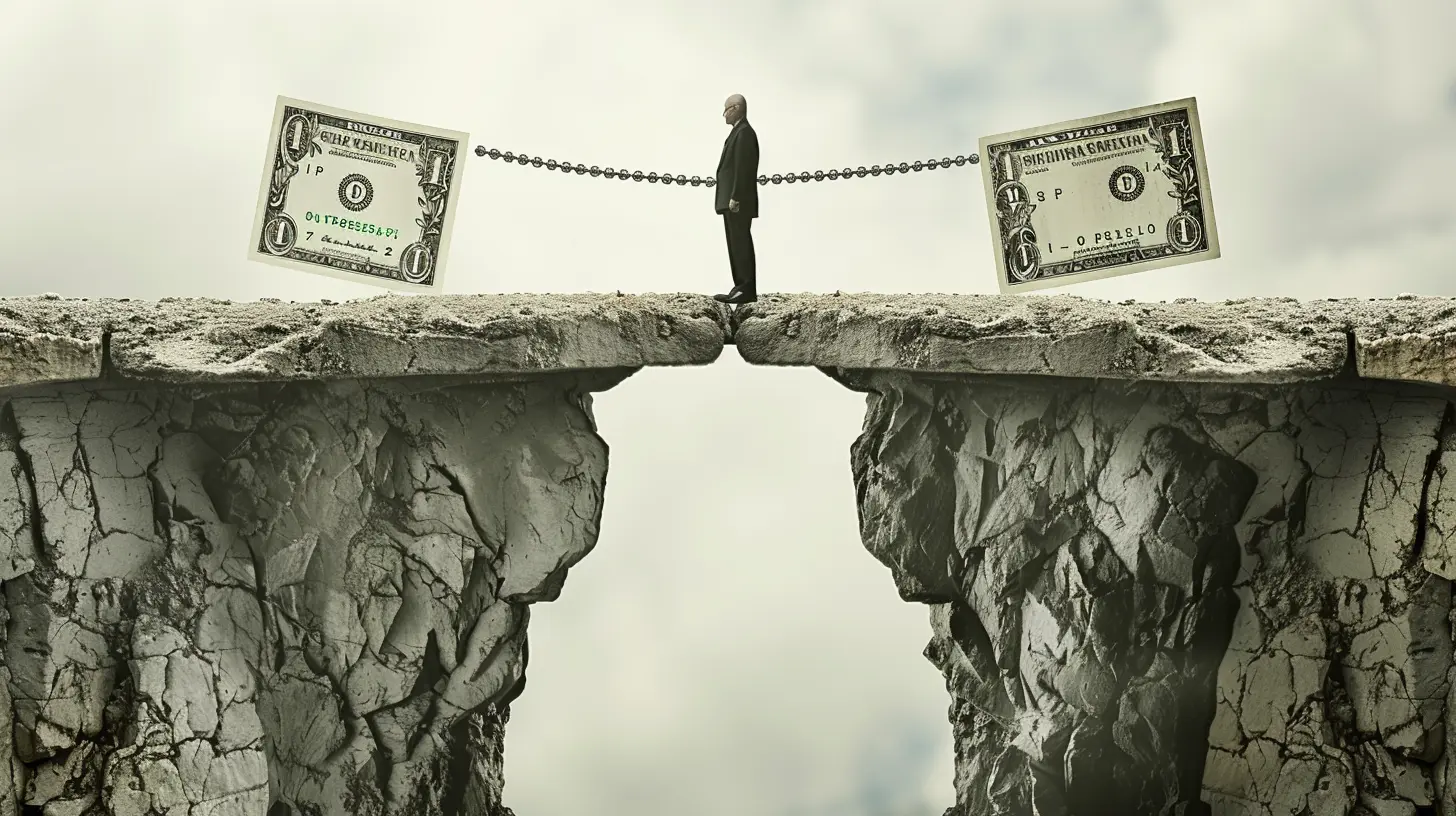Can Universal Basic Income Bridge the Inequality Divide?
5 October 2025
Imagine waking up every month to find a deposit in your bank account—no strings attached. Sounds like a dream, right? Well, that’s the basic idea behind Universal Basic Income (UBI). With rising inequality, stagnant wages, and disappearing jobs due to automation, UBI is gaining attention as a potential solution to bridge the gap between the haves and have-nots.
But can it really fix the growing divide? Or is it just a utopian fantasy?
Let’s break it down.
What Exactly Is Universal Basic Income?
Put simply, Universal Basic Income is a government program where every citizen receives a set amount of money on a regular basis, regardless of their income, employment status, or wealth. No paperwork, no means-testing—just a recurring payment to help cover basic living costs.Think of it as financial oxygen. You’re still free to work and earn more, but you’ve got a safety net that lifts you from the edge of poverty.
Sounds kind of radical, doesn’t it? But it’s not as new as you might think.
A Quick Dive Into the History of UBI
UBI has been tossed around for centuries. Enlightenment thinkers like Thomas Paine floated the idea in the 18th century. Even U.S. President Richard Nixon flirted with a form of it in the 1970s.Fast-forward to today, and you've got tech billionaires like Elon Musk and Jack Dorsey singing its praises. Why? Because they see what's coming—robots taking over jobs, AI replacing workers, and millions potentially left behind by the new economy.
So the question isn't just "what is UBI?" but rather, "why are we finally taking it seriously now?"
Inequality: The Elephant in the Room
Let’s be real—income inequality is off the charts.In many parts of the world, the richest 1% own more than the bottom 50%. In the U.S., CEO pay has increased by over 1,000% since 1978, while worker wages have barely budged. Housing is unaffordable, healthcare is a luxury, and education is drowning people in debt.
Meanwhile, automation is creeping into every job sector. Self-checkouts, driverless cars, AI-powered algorithms—they’re replacing human labor, and fast. And while these innovations boost profits, the average worker isn’t seeing the benefits.
So, can UBI act as a pressure valve—relieving economic stress while enabling people to live with dignity?
How Could UBI Actually Reduce Inequality?
Alright, let’s get down to brass tacks. Here’s how UBI could potentially close the inequality gap:1. A Safety Net for Everyone
No more jumping through bureaucratic hoops to qualify for assistance. UBI is simple and inclusive. That means even people in informal or gig work (think Uber drivers or freelancers) get support.2. Power to Say “No” to Bad Jobs
When people aren't desperate, they’re less likely to accept low-paying, exploitative work. Employers may actually need to improve wages and working conditions to attract talent.It tips the power balance. It turns work into a choice, not a compulsion.
3. Boosting Entrepreneurship and Education
What would you do if money wasn’t always an issue? Maybe start that small business idea you've been dreaming of? Or go back to school to learn a new skill?UBI provides breathing room. It gives people the financial runway to take risks, pivot careers, or invest in themselves—all things that ultimately help the economy.
4. Reducing Crime and Improving Health
Studies have shown that reducing economic stress results in lower crime rates, better mental health, and improved physical well-being. When people aren’t constantly worrying about making ends meet, communities thrive.Need Proof? Let’s Talk About Real-World Examples
This isn’t just theory. Several UBI pilot programs have shown promising results.🧪 Finland’s UBI Experiment
From 2017 to 2018, Finland gave 2,000 unemployed citizens €560 a month. The result? Participants reported higher life satisfaction, less stress, and felt more empowered to find meaningful work.🇨🇦 Ontario’s Basic Income Pilot
Before it was cut short, the initiative provided around 4,000 low-income Canadians with monthly payments. Reports showed improved health, better housing, and increased work stability.🇺🇸 Stockton, California Trial
This one really turned heads. For over a year, 125 residents received $500 per month with no conditions. The outcome? Full-time employment actually went up, not down. People used the money to cover essentials, reduce debt, and build better lives.The key takeaway? People tend to make responsible choices when they have a financial cushion.
But Wait—Isn’t UBI Crazy Expensive?
Great question. Yes, UBI costs money—no doubt about it. But it’s not necessarily as unaffordable as critics make it out to be.Let’s do some simple math: If a country gave every adult $1,000 a month, it’d cost trillions. But not all of that would be “new” spending.
Here’s how we can fund it:
- Reallocating existing welfare programs (consolidation and simplification)
- Taxing wealth and financial transactions
- Carbon taxes or tech taxes
- Reducing crime, healthcare, and unemployment costs over time
It’s more about shifting priorities than printing new money. And hey, if we can bail out banks and fund endless wars, why not invest in people instead?
What About Inflation? Will Prices Skyrocket?
That’s one of the biggest fears surrounding UBI. Won’t handing out cash cause everything to become more expensive?Not necessarily.
If everyone gets the same amount, demand increases—but so does supply. Plus, prices are driven by many factors (like supply chain costs, corporate pricing strategies, etc.), not just consumer demand.
In fact, in smaller UBI trials, inflation hasn’t been an issue. When people spend money on basics—food, rent, childcare—it fuels the local economy without necessarily driving up prices.
Also, UBI is different from printing money. It could be backed by taxes or budget reallocations, preventing inflationary spirals.
The Critics Have Their Say
Now, not everyone is sold on UBI. Some common criticisms include:- “It’ll make people lazy.”
- “It discourages hard work.”
- “It rewards everyone—even the rich.”
But studies have largely debunked the “laziness” myth. Most people still work—not because they need to, but because they want to. Work gives us purpose, identity, structure. UBI doesn’t eliminate that—it just gives people choices.
As for giving money to the rich? Sure, UBI is universal. But you can tax the rich right back through progressive taxation. The key is simplicity—less red tape, fewer loopholes.
UBI vs Traditional Welfare: What’s the Difference?
Let’s clear this up—UBI isn’t meant to fully replace all social programs. It’s more like a foundational layer.Think of it like laying down the floor in a house. You still need walls (e.g., healthcare, housing support, education), but at least everyone starts on solid ground.
Traditional welfare is often targeted, means-tested, and bureaucratic. UBI removes stigma, simplifies administration, and puts trust in people.
Could UBI Actually Widen the Divide?
Okay, let’s play devil's advocate. What if UBI doesn’t work as intended?There’s a risk that UBI becomes a band-aid—a quick fix that politicians use to avoid tackling deeper systemic problems like wage stagnation, housing inequality, or broken healthcare systems.
The danger? Using UBI to say, “We gave everyone money—problem solved!” while ignoring the root causes of inequality.
That’s why UBI should be part of a broader strategy, not a standalone miracle cure.
So, Can Universal Basic Income Bridge the Inequality Divide?
The answer? Yes… but only if we do it right.UBI isn’t a silver bullet, but it’s a powerful tool. It provides dignity, freedom, and opportunity. It levels the playing field, sparks creativity, and supports the economy from the ground up.
It’s about giving people a chance—not just to survive, but to thrive.
We’re at a crossroads. With increasing economic uncertainty and technological disruption, we need bold, imaginative solutions. UBI challenges us to rethink what it means to build a fair and humane society.
So, is it time to stop asking whether we can afford UBI—and start asking whether we can afford not to try?
Final Thoughts
The idea of Universal Basic Income might seem radical, but the gap between the rich and the poor is becoming more dangerous by the day. By providing a basic income to all, we give people the freedom to make choices, invest in themselves, and live with dignity.Sure, it’s complex. But innovation always is.
What do you think? Could UBI be the lifeline we need—or is it just wishful thinking?
Let’s keep the conversation going.
all images in this post were generated using AI tools
Category:
Income InequalityAuthor:

Zavier Larsen
Discussion
rate this article
1 comments
Matilda Carrillo
This article presents a crucial discussion on Universal Basic Income (UBI) and its potential to address inequality. However, it's essential to address practical implementation challenges and unintended consequences to ensure UBI effectively supports those in need without fostering dependency.
October 14, 2025 at 11:36 AM

Zavier Larsen
Thank you for your insightful comment! You're absolutely right—addressing practical implementation challenges and potential unintended consequences is vital for UBI to effectively combat inequality. Your feedback highlights an important aspect of the discussion.


